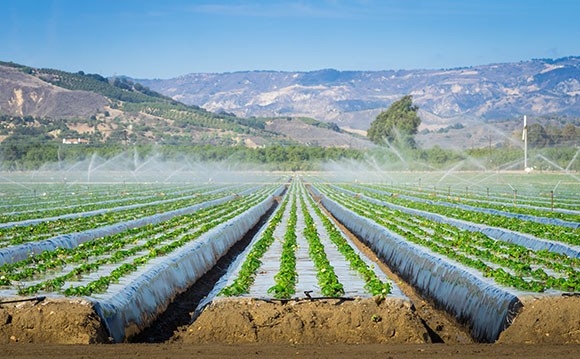Virginia REIT targets Central Coast ag land
IN THIS ARTICLE
- Agribusiness Topic
- Elijah Brumback Author
By Elijah Brumback Friday, November 14th, 2014

One of Ventura County’s many strawberry fields, visible from the region’s roadways. (Nik Blaskovich / Business Times photo)
Even in the face of the worst drought in decades, investing in California agricultural land is a hot real estate strategy for institutional investors.
Land values continue to rise along with the rents, and REITs, or real estate investment trusts, are looking more to the shrinking supply of farmland for better-than-average fixed income returns.
Gladstone Land Corp., a Virginia-based, publicly held REIT, recently snapped up several pieces of Ventura County berry-growing land, and the firm continues to hunt for land deals in San Luis Obispo and Santa Barbara counties.
Gladstone announced Nov. 5 it had acquired a strawberry farm consisting of 65 acres in Ventura County for $6.1 million. The REIT also signed a three-year lease with a major international grower to farm the property.
“We are excited to add this trophy property to our portfolio and extend our partnership with a global leader in the berry business, who also farms some of our other properties,” said Bill Reiman, managing director of the company. “We have recently been able to take advantage of a number of great buying opportunities in Ventura County, an area that commands among the highest farmland rents in the country.”
The land in the region continues to experience steady value appreciation and produce larger yields, even in times of severe drought or economic downturn, he said.
“Our California farms have yet to feel any negative impact in value from the drought because we are careful to choose properties with superior water resources and tenants that properly manage those resources.”
Prior to the most recent deal, Gladstone announced Oct. 30, it had acquired two farm consisting of 332 acres in Ventura County for $24.6 million.
The property is leased to Sunrise Growers and farmed for berries and tomatoes by Eclipse Berry Farms, a grower and marketer of fresh fruits and vegetables.
The two leases each have a remaining term of nine months with one two-year renewal option.
“We’re seeing evaluations continue to rise and land rents continue to rise,” Reiman told the Business Times. “We really would like to get into Santa Barbara and SLO counties, but we haven’t seen anything that meets our objectives yet. … Ventura County will always be a major area for us and we’ll continue to add to that base.”
According to the Spring 2014 Farmland Trend outlook from the California Chapter of the American Society of Farm Managers and Rural Appraisers, values produced by berry farmland have skyrocketed over the last several years.
The report shows that 2013 coast cropland values per acre hit $90,000-plus in Ventura County and just over $50,000 in Santa Barbara and SLO counties, primarily driven by increased profits in the wine and vegetable industries and growth in the berry industry.
Another market driver is the scarcity of land available for purchase or development, the report continues.
Gladstone’s new tenant Sunrise Growers, one of largest strawberry producers in the world, was founded more than 40 years ago and provides both frozen and fresh strawberries and other fruit products to retailers, food-service operators and industrial customers.
It also markets and distributes strawberries. The Placentia-based company was acquired by Sun Capital Partners in June 2008 from Heritage Partners, which had recapitalized the company five years earlier.
The sale price reportedly was $32.5 million, according to Fortune. In March of last year, a Sun Capital affiliate exited Sunrise Growers following the investment of another private equity firm, Paine and Partners.
“These farms have been rented for many years, and we expect them to be rented for many years into the future. Our goal of having strong tenants on premium land is certainly met in this transaction,” Reiman said. “We look at ourselves as a service business, either buying land and allowing the companies that farm them to put the the capital back into their operations, or making additional acquisitions for a grower.”
Gladstone also owns three coolers and one box barn for various farming operations. The company also has four properties worth $35 million under signed purchase deals expected to close by the end of the year.
The company owns 32 farms, comprised of 8,039 acres in five different states across the U.S., valued at approximately $191 million. Its acreage is predominantly concentrated in locations where tenants are able to grow row crops, such as berries and vegetables, which are planted and harvested annually or more frequently, as well as permanent crops, such as blueberries.
The acquisitions continue to add to the annual rent payments Gladstone receives. The three farms that closed in the third quarter will bring in an additional $1.5 million per year in payments.
“We have recently put a substantial amount of new farms on our books at rental rates that will bring additional income into our company,” said chairman David Gladstone during an Oct. 28 earnings call.
Before taking Gladstone Land public, the company started off as a private California-based berry and vegetable farming and distribution business called Coastal Berry.
In 2004, the company sold its operations to Dole Food Co., but kept the land and leased it back to the multinational food producer. The company raised $51.5 million in its initial public offering last year.










